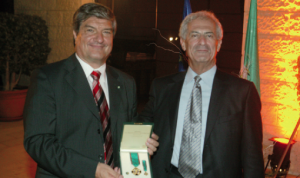FEATURES Remembrance: New Horizons ahead
Ambassador Sandro De Bernardin (in the picture with demographer Sergio Della Pergola), recently appointed Head of the Italian Delegation of the International Holocaust Remembrance Alliance, is resolute and full of energy. His name is not new to Italian diplomacy, working as the Italian ambassador in Israel and holding several tasks of significance at Farnesina’s Director General for Political Affair and Security. His competence on Remembrance, research and education, the main themes of IHRA, goes hand in hand with the attention developed during long years of work on delicate topics. His first words are to underline the importance of an international institution – the once called Task Force for International Cooperation on Holocaust Education, Remembrance, and Research (ITF) – created in 1998 by Sweden’s prime minister.
In fact, Goran Persson was surprised by the results of a survey that showed how many students didn’t believe in what happened during the Shoah. A debate on the education of Remembrance in Sweden followed, and it led to a great diplomatic action which in 1998 will transform in the first meeting of IHRA. Thanks to the help given by Yehuda Bauer, a scholar of the Shoah at the Hebrew University in Jerusalem, who took on himself the academic aspect, and the strong international support, the organization could count Germany and Israel as its members already in 1998, while Italy took part in it the year after. Nowadays the member countries are 31, with 8 observer countries, but the work of fifteen years goes almost unnoticed.
“First of all I’m sure this particular network should be getting more attention. Everyone should know about the incredible results we reached during these years, thanks to the strong and constant exchange of experiences among the member countries,” said De Bernardin.
Few weeks after being elected by the Minister of the Education Stefania Giannini, the ambassador wants to underline his support to the principles of the institution, that is to educate, to stimulate academic research, to support the conservation of Remembrance sites and to develop an effective communication. “I’m not worried about the aspects of information and communication because the responsible for the Italian Delegation is Simonetta della Seta, who can count on the support of everybody and in particular of Miur (i.e. Italian Ministry of Education) schools.” Identifying Miur as the governmental institution in charge of defining the members and the aim of the delegation is not a choice shared by all of the member countries, but in Italy – De Bernardin explains – the idea was to focus the attention on education.
“We’ve been working on an Italian agenda, right now in the hands of Minister Giannini, since the end of the plenary meeting that started at the beginning of November in Debrecen, Hungary – state that assumed the Chairmanship of the IHRA for 2015 and will be followed by Romania and Switzerland – and takes place every six months”.
In Debrecen the awareness regarding the characteristic pressure that the international crisis put on such delicate topics was high. “The flow of people in search for asylum may cause intolerance and xenophobia, a refusal of other people that troubles us. During the last few weeks we’ve seen a worrying escalation of this phenomena that led to the closure of some borders and to the use of a language more and more dehumanizing. I truly believe that right now it is important to remind to ourselves that Remembrance can be an antidote to these events. In this case, Italy is seen as a country with a solid experience, to which other nations with similar problems to solve can look at as an example. It has to be said that some governments are close to forms of sick nationalisms, and that’s when IHRA plays and important role, as I was pleased to discover during these few weeks as Head of the delegation”.
Another remarkable fact: every country is regularly examined by the other members of the association in order to evaluate the situation and their work, with a constant exchange that De Bernardin defines as “stimulating and useful for everyone.” The job of the Italian Delegation gets split into specialized groups: “For the academic part – De Bernardin explains – I can count on professor David Meghnagi of Roma Tre University, and on Anna Piperno of Miur for education. The knowledge of Marcello Pezzetti and Sira Fatucci of UCEI is of great help to the committee for the conservation and the museums.”
*This article has been translated in English by Letizia Anelli, student at the Scuola superiore interpreti e traduttori di Trieste, who is doing her apprenticeship within the newsroom of Pagine Ebraiche.

